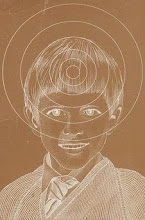
A few days back I posted a link to my Clash review of the recent Kraftwerk Catalog set. That was the original version, and the one that was published. But I was also asked to produce an album-by-album version to fit in with a larger feature. In truth, I prefer it to the one they went with in the end. Ho hum.
Kraftwerk - The Catalog
You already know Kraftwerk, of course. That’s right, the robot guys. Techno pop and “fahren, fahren, fahren auf der autobahn”. Given that this retrospective box set of Düsseldorf’s finest export has been on the cards for six years now, you could be forgiven for thinking that it might highlight another side of the band with unreleased material. Or, like the Beatles remasters, polish up the old songs and make them sound box fresh and brand new again.
Well it doesn’t. Not even a little.
No, what we have here is a straight up reissue of the canonical Kraftwerk: the eight core albums, including The Mix, but not a trace of their long out of print first three records, or live document Minimum-Maximum. And don’t go expecting any unheard material. This ain’t no Neil Young Archives, son. According to the band this is all they have, and the sole “new” track here is an old remix, slotted into the Techno Pop track listing.
Sure, the remasters are nice, giving everything a deeper, richer sound, but they’re hardly a revelation. If you already own these albums there’s no need to double-dip.
Still, there’s no escaping that this is some of the finest, most evocative and influential electronic music ever recorded. And unlike those mono Beatles sets, you can buy the albums separately. But which ones should you pick?
Autobahn (1974)
Despite what you may have heard, there is more to this album than the title track. There’s the industrial horror of ‘Mitternacht’, and the two parts of ‘Kometenmelodie’ are a clever exercise in light and shade. But really, you’re here for ‘Autobahn’ itself. An unlikely international hit and their most iconic song, it’s compelling for every one of its 22 minutes thanks to that gorgeous melody and Beach Boys aping chorus.
Rating: 9/10
Radio-Activity (1975)
Poor Radio-Activity. Sandwiched between two acknowledged classics, and lacking in any of the hits, it’s always looked like a bit of a slouch in comparison. With shorter tracks and more of a vocal presence than its predecessor, it should be an easier album to love, yet it lacks Autobahn’s joy. Still, the title track is darkly funny and in the album’s electronic whispers, legions of techno artists found their inspiration.
Rating: 7/10
Trans-Europe Express (1977)
Techno overlord Carl Craig once described Kraftwerk as, “so stiff, they were funky”. Nowhere is this more apparent than on the clattering rhythms of this, their finest album. A more diverse record than Autobahn, an album it shares thematic similarities with, it also includes ‘Europe Endless’, a euphoric, open-hearted love letter to the continent and the cynical synthpunk of ‘Showroom Dummies’. Their finest hour.
Rating: 10/10
The Man Machine (1978)
While their previous three albums had proved that Kraftwerk were capable of producing great singles, they hadn’t made an all out pop album – until now. ‘Spacelab’ has a disco groove, which sounds like the missing link between Donna Summer and an old piece of library music, while ‘Neon Lights’ wouldn’t seem out of place on an LCD Soundsystem album. Their most contemporary sounding record, it’s perhaps not as rewarding over the long-term as earlier efforts, but you’ll be too busy dancing to care.
Rating: 8/10
Computer World (1983)
Fans may have been shocked when Wolfgang Flür’s biography revealed that Kraftwerk weren’t really androids, but a gang of horny young men, but it’s obvious here and on The Man Machine. From longing for a “rendezvous” on ‘Computer Love’ to the model about to be taken home, this is sex pop for robot romps.
It’s also the beginning of the end. Computer World is a very good album, but over-familiarity has set in. There’s no shock of the new, as on previous records and this feels like The Man Machine’s poorer cousin.
Rating: 7/10
Techno Pop (1986)
The album formerly known as Electric Café had a troublesome birth, blighted by Ralf Hütter’s nasty cycling accident and with recording dragging out over five years. For the first time Kraftwerk seemed to be struggling for ideas. Sure, ‘Musique Non Stop’ is jolly enough, but did it really need stretching across half the album? Shortly after its release, the Kling Klang studio went into lockdown and members started to drift away. It was the last full Kraftwerk album for fourteen years.
Rating: 6/10
The Mix (1991)
This 1991 disc is the closest Kraftwerk ever got to an official greatest hits package, taking all of their big hitters, except for ‘The Model’ weirdly, and giving them a nineties reinterpretation. Unfortunately, that largely just means adding a tinny house beat. It works on a few of the tracks; ‘Radioactivity’ is transformed into a fairly convincing floor-filler, and ‘Autobahn’ gets to the point in half the time. But for the most part this simply succeeds in making Kraftwerk sound both more dated and conventional than the original tracks.
Rating: 4/10
Tour De France (2003)
For a band who spent so long as innovators, it’s peculiar that their first (and so far only) album this millennium revisits a single from 1983. There are no less than four versions of Tour De France here. It’s nice enough, sure, but hardly in their top flight. Newer songs like ‘Aero Dynamik’ and ‘Vitamin’ are better, sounding how you imagine Kraftwerk. v2.0 should sound – upgraded and more efficiently funky than ever. Still, they’re slim pickings on an over-long and not always compelling record.
Rating: 6/10

No comments:
Post a Comment